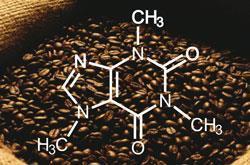Simon Cotton takes a look at those compounds that find themselves in the news or relate to our everyday lives.

Is caffeine safe?
Why do you ask?
Well, it's been in the news that a young man died from caffeine poisoning
Yes, a 23 year old from Mansfield took two spoonfuls of caffeine dissolved in an 'energy drink', and was soon unwell. He later died in hospital, where they measured his blood caffeine level as 251mg l-1.
And that's lethal?
The coroner said it was 70 times more than usually obtained from a high energy caffeine drink. 'Normal' doses of caffeine are around 50-100mg per cup of tea or coffee. A lethal dose of caffeine is above five grams, which would correspond to rather a lot of cups.
What about an energy drink?
The amount of caffeine in a 250ml can of cola is 25-35mg - less than a cup of tea. A can of Red Bull is said to contain about 80mg of caffeine, so this is safe but don't overdo it. The real problems come with people taking solid caffeine and there have been fatalities with people consuming several whole packs of caffeine 'energy tablets', such as 100 x 100mg tablets and 400 x 50mg tablets.
Why does caffeine give me a buzz?
Caffeine has a similar structure to adenosine and thus binds to adenosine receptors in the body; this leads to increased dopamine and glutamate activity, and ultimately to more adrenalin production. Because of this, caffeine is an addictive drug - a cardiac stimulant with mild diuretic effects.
It's not just humans who are affected by caffeine. NASA scientists tested the effects of a range of drugs on house spiders, finding that caffeine had the most effect upon them, their webs lacked patterns and consisted of relatively few, random threads.
Why do plants make caffeine anyway?
Caffeine is 1,3,7-trimethylxanthine; it is found especially in coffee, tea and the cola nut.
These plants make it as a 'secondary metabolite' to protect themselves against insects; methylxanthines inhibit insect feeding and are also pesticides, as they inhibit phosphodiesterase activity.
Can you get decaff coffee plants?
At present, decaffeinated coffee is produced by using a solvent like supercritical CO2 to dissolve the caffeine out of the beans (which can be then used to make 'energy drinks'). When the coffee plant makes caffeine from xanthosine, key steps involve the introduction of methyl groups. Scientists have isolated the genes that encode for the N-methyltransferase enzymes and when they expressed these genes in tobacco plants, they found that the plants would make caffeine and repel the normal insect predators. Scientists are now engineering low-caffeine plants.






No comments yet